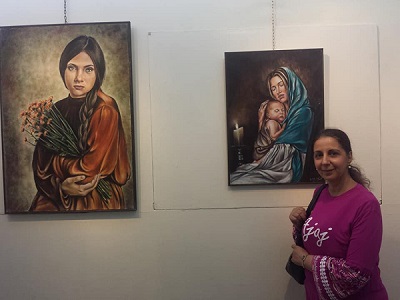A collective plastic art exhibition was held on Monday at the Arab Cultural Center in “Abu Rummanah”, Damascus under the title “Mother is the homeland”. 10 artists participated in the exhibition that will continue till the 20th of the current month, displaying about 25 five paintings.
The artists displayed paintings that reflected their talents. The diverse works depicted portraits of women nature, family and society. The artists presented paintings of women who have suffered from poverty and displacement during the past ten year of crisis in Syria .Also, other paintings reflected the optimistic vision through showing the active role played by women in society.
 Adnan Qasem, participant artist told Syria Times (e-news paper) that he displayed five paintings that reflect two stages in life of women, one is before marriage and the second is after marriage. He wants to show the difficult journey of women in life which is full of fatigue.
Adnan Qasem, participant artist told Syria Times (e-news paper) that he displayed five paintings that reflect two stages in life of women, one is before marriage and the second is after marriage. He wants to show the difficult journey of women in life which is full of fatigue.
“My paintings reflect the tragic part in the life of women in different stages such as suffering, agony and waiting. I focus in my works on humanitarian themes to show reality” Adnan said.
In his fourth collective participation Adnan used earthy and autumn colors to represent despair, loss and disappointment in women.
 Seham Meheisen is another participant in the exhibition. She said: “I took part in two works; the first is an expression of love and tenderness for motherhood, and the second is to show the loss of hope in women‘s life”. “I express my inner ideas, my inner feeling so I focus in my portraits on the features of the face”.
Seham Meheisen is another participant in the exhibition. She said: “I took part in two works; the first is an expression of love and tenderness for motherhood, and the second is to show the loss of hope in women‘s life”. “I express my inner ideas, my inner feeling so I focus in my portraits on the features of the face”.
 Reem Kibtan, the organizer of the exhibition, participated with two portraits .The first one is an oil painting of her young daughter showing the promising future.
Reem Kibtan, the organizer of the exhibition, participated with two portraits .The first one is an oil painting of her young daughter showing the promising future.
The second portrait expresses herself in a realistic and symbolic style. She wants to highlight the close relation between motherhood and homeland.
It is worth mentioning that the participating artists want to present their diverse visions and to honor the mother and the homeland that are the most precious things in our life.
Interviewed by: Nada Haj Khidr




